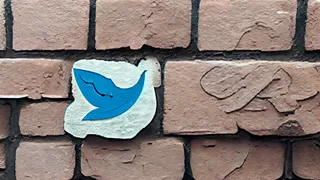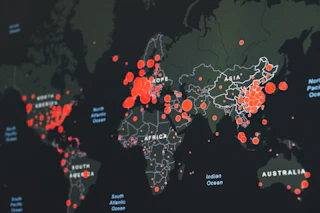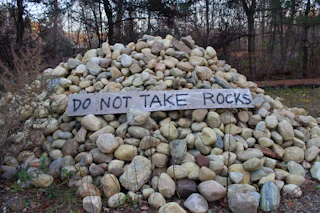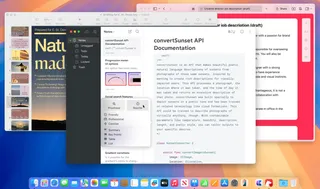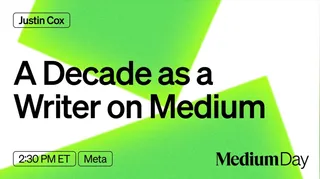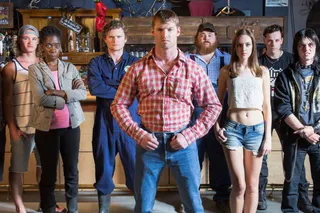It’s Time to Rebel from Mass Market Social Media
This Just In: IT is the villain in Silo. We should learn from those in the Down Deep and rise up.

Hugh Howey released the first part of Wool in 2011. In the post-apocalyptic world he created, the whole of humanity lives in a 144-story underground silo. The Great Staircase connects the silo’s levels, and there is no elevator. People are slow to travel throughout the silo and few venture from the Down Deep to the Up Top.
Communication in the silo is handled through Porters, who ferry messages and goods throughout the Great Staircase in their packs and on their lips. The information travels as quickly (or as slowly) as a Porter can climb the stairs.
Email, while available, is one chit (currency) per character. People accept this way of life, understanding that servers and electricity cost money to keep running. But is that actually true?
In the Silo, email communication is cost-prohibitive to keep information, well, siloed. Ideas left in people’s heads aren’t a threat. Ideas shared throughout the silo, however, lead to rebellion.
In a Q&A at the end of Wool, Hugh Howey explains why this is the case:
Question: Why no elevators? Answer: The same reason communication is expensive -- those in power fear our ability to come together and share ideas, thoughts, and dreams.
IT is the villain of the Silo universe. They control the flow of information and, as a result, the balance of power. When those in the Down Deep realize they’re being intentionally kept ignorant, rebellions rise.
The world of Silo is far from fiction. Right-wing ideology has waged war on public information for years. Controlling the flow of information controls society. Billionaires have purchased newspapers and TV stations to control the public narrative. Now, they’re doing the same with social networks.
Elon Musk purchased Twitter to supposedly eliminate bots, protect free speech, and reduce spam. In the years since, the opposite has proven true. The platform has devolved into a fraction of its former self, riddled with bots, conspiracy theories, and right-wing ideology. Those with divergent views have either left the platform or have been silenced. So much for free speech.
Whether this was always the intention or simply a byproduct, Musk’s Twitter acquisition has had a chilling effect on public information. And now he’s set his sights on Wikipedia. As Molly White reports in Citation Needed:
When Elon Musk launched his latest crusade against Wikipedia this Christmas Eve, it wasn’t just another of the billionaire’s frequent Twitter tantrums. His gripes about the community-written encyclopedia expose something far more significant: the growing efforts by America’s most powerful right-wing figures to rewrite and control the flow of information. While Musk’s involvement began with grievances about his own coverage on the website, his recent attacks reveal his growing role in this broader campaign to delegitimize Wikipedia, and the right’s frustration with platforms that remain resilient against such control.
Those who control the flow of information want finding quality or vetted information to be difficult. They also have free reign to promote their preferred ideology. At the scale of social media, this level of control impacts entire populations.
Perhaps in taking a page from Musk’s playbook or in an attempt to curry favor with the incoming Trump administration, Mark Zuckerburg has outlined what his control of Meta will look like moving forward. Spoiler alert: it’s pretty bleak.
Hate speech is now perfectly acceptable on Meta platforms. Zuckerburg also announced the elimination of fact-checking and content moderation teams. As if that didn’t emphasize the point enough, the next day, Meta killed all diversity, equity, and inclusion teams.
As Ryan Broderick puts it in Garbage Day:
Under Zuckerberg’s new “censorship”-free plan, Meta’s social networks will immediately fill up with hatred and harassment. Which will make a fertile ground for terrorism and extremism. Scams and spam will clog comments and direct messages. And illicit content, like non-consensual sexual material, will proliferate in private corners of networks like group messages and private Groups. Algorithms will mindlessly spread this slop, boosted by the loudest, dumbest, most reactionary users on the platform, helping it evolve and metastasize into darker, stickier social movements. And the network will effectively break down. But Meta is betting that the average user won’t care or notice.
Twitter, Substack, and now Meta are all attempting to legitimize hate by mixing it with pictures of your lunch and messages from your grandmother. They don’t want us to care or notice until we start believing their nonsense is normal, when it is anything but.
As Hugh Howey said, those in power fear our ability to share thoughts and ideas. They don’t want a free exchange of information. They don’t want a public square. It’s time to follow the Down Deep’s lead -- it’s time to rebel.
We have to break free from corporate-controlled networks and rebuild the free and open internet.
Humanity is a vast tapestry of ideas and perspectives; our internet should reflect that. We shouldn’t be limited to the singular viewpoint of a few wealthy white men.
Thankfully, the easiest way to rebel is to share our ideas, thoughts, and dreams. As Jay Hoffmann states in The History of the Web:
Here’s the thing about you. You know something nobody else does. You have a perspective that nobody else does. Information doesn’t have to just be information, it can be whatever you want it to be. Start a blog. Post an art project. Write a poem. Create a fan page. Contribute to a Wikipedia article you know something about. These little actions, these little contributions, are the best way we have to claw back to a truly free web.
We take back the web by sharing ideas. And not on a hate-fueled platform, but on something we own.
The Fediverse and the open web are the future of social platforms.
At a time when tech moguls are consolidating power and paying homage to their next leader, Mastodon is changing its corporate structure to be governed by a public nonprofit.
Mastodon was founded on the principles that people should be able to control their social circle online, curate their own timeline, and convene freely with any community of their choosing. We believe social media should help users build bridges, not walls. And we believe this is best achieved through federation.
Mastodon isn’t perfect, but it is far superior to Meta’s Threads and Twitter. Bluesky, while technically a decentralized platform, is owned by a venture capital firm focused on profits. Mastodon, on the other hand, is focused on the community.
Meta, Twitter, Substack, and their ilk want to lock us into their networks. They do this by eating more and more of our social graph so it becomes extremely difficult to leave. I joined Facebook in 2004 -- that is a significant portion of my life documented on their servers. Can you just walk away from all of that?
We each have to decide how we rebel for ourselves. You may wholly delete your accounts and walk away. Someone else may only be willing to reduce usage or delete the app in case things change down the road.
However you choose to rebel, I encourage you to choose independent options wherever possible. The less we engage in a billionaire’s playground, the less control they have over us all.
Related Reads
It’s the End of the Year as We Know It (and I Feel Tired)
• LifeThis Just In: It’s time to look back at the year that was and set up some hopes and dreams for the year to come, or something like that.
Abuse of Power Comes for Nonprofits
• LifeThis Just In: Wikipedia’s 501(c)(3) tax exemption is threatened, but not by the IRS.
Update Those Mute Filters
• Social MediaThis Just In: Let’s collectively scream into the infinite abyss, find ourselves, and make the world better.
It’s Time to Rebel from Mass Market Social Media
• Featured • Social MediaThis Just In: IT is the villain in Silo. We should learn from those in the Down Deep and rise up.
The Forthcoming First Amendment Fight
• CraftThis Just In: So-called defenders of free speech are taking office, and we’re all in trouble. Plus, more predictions for 2025.
Empire Strikes Back Isn’t the End of the Series
• Featured • LifeThis Just In: Last week sucked, but there is always hope.
It’s Time to Verify the Internet
• Social MediaTwitter’s new Birdwatch feature is a good step, but more needs to be done.
It’s the End of the Year as We Know It (and I Feel Tired)
• LifeThis Just In: It’s time to look back at the year that was and set up some hopes and dreams for the year to come, or something like that.
Update Those Mute Filters
• Social MediaThis Just In: Let’s collectively scream into the infinite abyss, find ourselves, and make the world better.
It’s Time to Rebel from Mass Market Social Media
• Featured • Social MediaThis Just In: IT is the villain in Silo. We should learn from those in the Down Deep and rise up.
The Forthcoming First Amendment Fight
• CraftThis Just In: So-called defenders of free speech are taking office, and we’re all in trouble. Plus, more predictions for 2025.
Platforms Are Getting Much Worse
• PublishingThis Just In: Platforms want us to know exactly who controls the internet. It’s not us, but it can be!
Where Have All the Cowboys Gone
• Social MediaThis Just In: social media is bleeding users, but where are they going?
Let's Make the Internet Personal Again
• Featured • PublishingThis Week In Writing, we look at the once-in-a-generation opportunity to create a new internet filled with fun and originality.
My First Year on Mastodon and the Future of Social Media
• Social MediaThis Week In Writing, we look back at how social media fractured and why it’s a good thing for us all.
A New Era Begins
• PublishingThis Week In Writing, we explore the internet’s current metamorphosis and how you can be part of the revolution.
Saving Frequently Isn’t The Only Way To Backup Your Writing
• CraftThis Week In Writing, we take a hard lesson from the latest Twitter/X hijinks. Plus, we look at what “human writing” means.
Do CTAs Even Work Anymore?
• PublishingThis Week In Writing, we explore the “necessary evil” of calls to action and ask if they are any better than tacky banner ads.
We Have to Talk About Platform Proliferation
• Social MediaThis Week In Writing, we ask why no platform is content on doing one thing well and instead want to do all things poorly.
We Have to Talk About Substack
• Featured • PublishingThis Week In Writing, we talk about Diffusion of Innovation Theory and dying platforms.
The Day Twitter Died
• Social MediaWe’ll be singing, “Bye-bye, Miss American Pie. Drove my Tesla to the office, but there was just one guy.”
This Just in: Will Twitter Verification Save Twitter
• Social MediaElon Musk wants everyone to pay $8/month for Twitter verification, but will that save the platform or alienate people?
The Secret To Freelance Success
• FreelancingWhat I’ve learned after three months as a full-time freelance writer
How To Be A Successful Freelance Writer
• FreelancingEvery choice brings you closer to success. Or does it?
A Love Letter to Entrepreneurship
• Featured • LifeSometimes you just need to tell some(thing) how you feel. This love letter to entrepreneurship conveys what it means to be a "founder."
It’s the End of the Year as We Know It (and I Feel Tired)
• LifeThis Just In: It’s time to look back at the year that was and set up some hopes and dreams for the year to come, or something like that.
Update Those Mute Filters
• Social MediaThis Just In: Let’s collectively scream into the infinite abyss, find ourselves, and make the world better.
It’s Time to Rebel from Mass Market Social Media
• Featured • Social MediaThis Just In: IT is the villain in Silo. We should learn from those in the Down Deep and rise up.
The Forthcoming First Amendment Fight
• CraftThis Just In: So-called defenders of free speech are taking office, and we’re all in trouble. Plus, more predictions for 2025.
Platforms Are Getting Much Worse
• PublishingThis Just In: Platforms want us to know exactly who controls the internet. It’s not us, but it can be!
The Downside of Personal Platforms
• PublishingCreators need to think carefully about their personal sites and build in a way that prevents link rot.
Maybe I’m Bad at Social Media
• Social MediaSocial media “growth” requires giving in to quantity over quality. I don’t play that game.
Generative AI in Creativity
• AIThe reader survey results have some interesting things to say about generative AI and creativity. Here’s why that’s a problem.
Where Have All the Cowboys Gone
• Social MediaThis Just In: social media is bleeding users, but where are they going?
Pay People Not Platforms
• PublishingThis Week In Writing, we look at why Substack’s collapse is actually a good thing for paid newsletters.
Let's Make the Internet Personal Again
• Featured • PublishingThis Week In Writing, we look at the once-in-a-generation opportunity to create a new internet filled with fun and originality.
My First Year on Mastodon and the Future of Social Media
• Social MediaThis Week In Writing, we look back at how social media fractured and why it’s a good thing for us all.
The Economics of a Self-Hosted Newsletter
• PublishingThis Week In Writing, we talk about what happens when you eliminate platforms and go after it on your own.
A New Era Begins
• PublishingThis Week In Writing, we explore the internet’s current metamorphosis and how you can be part of the revolution.
My Writing Is About Building Community
• PublishingThis Week In Writing, we highlight some of the people I’ve met writing online and answer some of your questions.
Your Questions Answered
• EditorialThis Week In Writing, we recap a successful Medium Day and address some of the questions I didn’t have time to answer.
AI Is Now Everywhere
• AIThis Week In Writing, we talk about Google’s new AI plan, what it means for writers, and why resistance is futile.
BlueSky, Mastodon, and Notes; Oh, My!
• Social MediaThis Week In Writing, we talk about all the “Twitter Alternatives” and what makes the most sense for writers.
I Don't Want to Talk to You on WhatsApp
• Social MediaThis Week In Writing, we address an impersonation issue, talk about scammers, and settle a Mastodon issue.
You Have Questions, I May Have Answers
• CraftThis Week In Writing, we celebrate International Question Day by listening to Selena Gomez. What does that have in common? Keep reading!
The Era of Centralized Platforms Is Over
• Featured • PublishingThis Week In Writing, we discuss whether you should still own a website if you publish on Medium or Substack.
Introducing My Writing Community!
• EditorialA new way to connect with writers, discuss your interests, and receive feedback on your creative endeavors.
Are You Begging for Eyes in the Attention Economy
• Featured • PublishingThis Week In Writing, we explore the internet’s move away from the attention economy and how writers can make the web more personal
Use Better Words to Be More Inclusive
• CraftThis Week In Writing, we talk about words to avoid in 2023, a special offer from a friend, and Medium joining Mastodon
Welcome to 2023. Now Take A Nap.
• CraftThis Week In Writing, we kick off a new year with a chat about goals, self-care, and naps.
I Created a New Language in 5th Grade
• LifeThis Week In Writing, we explore our digital legacies, discuss permanence, and close out the year with something new.
It’s Time to Rebel from Mass Market Social Media
• Featured • Social MediaThis Just In: IT is the villain in Silo. We should learn from those in the Down Deep and rise up.
Platforms Are Getting Much Worse
• PublishingThis Just In: Platforms want us to know exactly who controls the internet. It’s not us, but it can be!
Metrics Don’t Matter
• CraftHave we become so accustomed to seeing metrics everywhere that they no longer mean anything?
Why Make Anything if You Don’t Think It Will Be Great?
• CraftThis Week In Writing, we discuss greatness and how chasing it is a possible and noble goal.
Pay People Not Platforms
• PublishingThis Week In Writing, we look at why Substack’s collapse is actually a good thing for paid newsletters.
My First Year on Mastodon and the Future of Social Media
• Social MediaThis Week In Writing, we look back at how social media fractured and why it’s a good thing for us all.
The Economics of a Self-Hosted Newsletter
• PublishingThis Week In Writing, we talk about what happens when you eliminate platforms and go after it on your own.
My History of Blogging
• PublishingThis Week In Writing, we celebrate the blog, explore the pendulum of online writing, and double down on quality.
How I Feel About Engagement Numbers
• PublishingThis Week In Writing, we discuss what engagement means and if I get discouraged by a perceived lack thereof. Plus, a look at the future (again).
My Writing Is About Building Community
• PublishingThis Week In Writing, we highlight some of the people I’ve met writing online and answer some of your questions.
It’s Time for a Fresh Start
• PublishingThis Week In Writing, we talk about new Apple products, home renovations, and changes to the newsletter.
Your Questions Answered
• EditorialThis Week In Writing, we recap a successful Medium Day and address some of the questions I didn’t have time to answer.
Saving Frequently Isn’t The Only Way To Backup Your Writing
• CraftThis Week In Writing, we take a hard lesson from the latest Twitter/X hijinks. Plus, we look at what “human writing” means.
MIT Says ChatGPT Improves Bad Writing, But At What Cost?
• AIThis Week In Writing, we explore how ChatGPT and Grammarly are making us all sound the same.
AI Is Now Everywhere
• AIThis Week In Writing, we talk about Google’s new AI plan, what it means for writers, and why resistance is futile.
My Ghostly Strategy: Avoid the Graveyard
• PublishingThis Week In Writing, we fully explore how I’m building Ghost into a self-hosted content hub and how you can too.
Another Platform Collapses
• Social MediaThis Week In Writing, we talk about Reddit and what it means for centralized communities moving forward.
The Problem With Creative Entitlement
• AIThis Week In Writing, we explore how AI tools amplify the sometimes problematic relationship between creator and consumer
This Just in Comes Home
• PublishingWelcome to the first issue of This Just In completely managed from my website!
BlueSky, Mastodon, and Notes; Oh, My!
• Social MediaThis Week In Writing, we talk about all the “Twitter Alternatives” and what makes the most sense for writers.
We Have to Talk About Platform Proliferation
• Social MediaThis Week In Writing, we ask why no platform is content on doing one thing well and instead want to do all things poorly.
On Tennis and Writing Breaks
• LifeThis Week In Writing, I discuss my prolonged break from daily writing and follow up on last week’s Substack article.
We Have to Talk About Substack
• Featured • PublishingThis Week In Writing, we talk about Diffusion of Innovation Theory and dying platforms.
The Era of Centralized Platforms Is Over
• Featured • PublishingThis Week In Writing, we discuss whether you should still own a website if you publish on Medium or Substack.
Introducing My Writing Community!
• EditorialA new way to connect with writers, discuss your interests, and receive feedback on your creative endeavors.
Let’s Talk About Money
• FreelancingThis Week In Writing, we talk about earning money as a writer online and check in on NaNoWriMo.
Is Revue Too Good to be True?
• FreelancingRevue is a newsletter tool that is deeply integrated with Twitter, but is it the right email marketing tool for freelancers?
This Just In: Social Authenticity
• Social MediaDid the coronavirus force us into an authentic form of social media?
AI Is Not an All or Nothing Choice
• Featured • AIThis Just In: AI use isn't a moral binary. There's a practical middle path for writers.
It’s Time to Rebel from Mass Market Social Media
• Featured • Social MediaThis Just In: IT is the villain in Silo. We should learn from those in the Down Deep and rise up.
Platforms Are Getting Much Worse
• PublishingThis Just In: Platforms want us to know exactly who controls the internet. It’s not us, but it can be!
Where Have All the Cowboys Gone
• Social MediaThis Just In: social media is bleeding users, but where are they going?
Let's Make the Internet Personal Again
• Featured • PublishingThis Week In Writing, we look at the once-in-a-generation opportunity to create a new internet filled with fun and originality.
My First Year on Mastodon and the Future of Social Media
• Social MediaThis Week In Writing, we look back at how social media fractured and why it’s a good thing for us all.
Saving Frequently Isn’t The Only Way To Backup Your Writing
• CraftThis Week In Writing, we take a hard lesson from the latest Twitter/X hijinks. Plus, we look at what “human writing” means.
AI Is Now Everywhere
• AIThis Week In Writing, we talk about Google’s new AI plan, what it means for writers, and why resistance is futile.
Another Platform Collapses
• Social MediaThis Week In Writing, we talk about Reddit and what it means for centralized communities moving forward.
ChatGPT, the Writer’s Strike, and the Future of Content Writing
• AIThis Week In Writing, we explore a middle-of-the-road approach to ChatGPT and the future of writing
BlueSky, Mastodon, and Notes; Oh, My!
• Social MediaThis Week In Writing, we talk about all the “Twitter Alternatives” and what makes the most sense for writers.
We Have to Talk About Platform Proliferation
• Social MediaThis Week In Writing, we ask why no platform is content on doing one thing well and instead want to do all things poorly.
We Have to Talk About Substack
• Featured • PublishingThis Week In Writing, we talk about Diffusion of Innovation Theory and dying platforms.
The Era of Centralized Platforms Is Over
• Featured • PublishingThis Week In Writing, we discuss whether you should still own a website if you publish on Medium or Substack.
Introducing My Writing Community!
• EditorialA new way to connect with writers, discuss your interests, and receive feedback on your creative endeavors.
Use Better Words to Be More Inclusive
• CraftThis Week In Writing, we talk about words to avoid in 2023, a special offer from a friend, and Medium joining Mastodon
I Created a New Language in 5th Grade
• LifeThis Week In Writing, we explore our digital legacies, discuss permanence, and close out the year with something new.
Would You Burn Your Entire Archive
• CraftThis Week In Writing, we contemplate throwing out our leftovers and slimming down our digital presence.
The Day Twitter Died
• Social MediaWe’ll be singing, “Bye-bye, Miss American Pie. Drove my Tesla to the office, but there was just one guy.”
This Just in: Will Twitter Verification Save Twitter
• Social MediaElon Musk wants everyone to pay $8/month for Twitter verification, but will that save the platform or alienate people?
The Fate of The Seven Kingdoms
• Social MediaThe future on social media is much like the Game of Thrones. Right now, the only thing missing is a dragon.
Write Now is My Tribe of Mentors
• CraftWhat I learned from Tim Ferriss’ Tribe of Mentors and my answers to his 11 great questions.
Spring Into the Best Twitter Client You’ve Never Heard Of
• Social MediaHow does the Spring Twitter client by Junyu Kuang stack up to Tweetbot and Twitterrific?
How I Edit and Manage The Writing Cooperative
• EditorialWhat writers and editors can learn from my experience editing The Writing Cooperative, one of Medium’s top publications
You Should Be on Twitter
• Social MediaThis Week In Writing, we explore how I’m shocked how many writers don’t take advantage of Twitter’s potential for writers.
How To Disconnect From The Internet Without Going Broke
• Social MediaWe can’t hand our social media accounts to a pricey team as celebrities do—but there are actionable steps we can take toward a healthier relationship with media.
Beware the Ides of March?
• CraftThis Week In Writing, we reclaim the Ides of March and turn it into a day to celebrate and lift writers worldwide.
Is Revue Too Good to be True?
• FreelancingRevue is a newsletter tool that is deeply integrated with Twitter, but is it the right email marketing tool for freelancers?
Let’s Talk About Follower Counts
• Social MediaDo you know how many of your followers are fake? Chances are, it’s a lot more than you think. As a result, following numbers are useless.
How To Make Social Media Great Again
• Social MediaIf you have 30 minutes, you have everything necessary to enjoy social media
Twitter To The Rescue
• Social Media📝 This Week’s Goal: Learn how to leverage Twitter to market your writing and build your audience.
It’s Time to Verify the Internet
• Social MediaTwitter’s new Birdwatch feature is a good step, but more needs to be done.
How To Be A Successful Freelance Writer
• FreelancingEvery choice brings you closer to success. Or does it?
So, You’re New to Medium…
• PublishingAre you new to Medium? Do you want to make the most of your new account and start writing and making money? This is the guide you need.
The Internet Was Doomed From the Start
• Featured • PublishingThis Just In: Maybe it’s time to rethink the entire internet.
Can We Talk About Comments?
• PublishingThis Just In: Hearing from readers is a lot of fun until you start to get spammed with bots and AI nonsense farming for attention.
The Cost of Rebellion
• Featured • Social MediaThis Just In: Rebellions are built on hope, but they require individual sacrifices for collective improvement.
The Age of Reaction
• Social MediaThis Just In: We’ve fallen into a dramascroll trap that will be very difficult to climb out of, but it isn’t impossible.
Tapestry Is Weaving the Future Web
• TechThis Just In: The Iconfactory’s smash new app is a return to the web’s roots and where we all need to head.
Update Those Mute Filters
• Social MediaThis Just In: Let’s collectively scream into the infinite abyss, find ourselves, and make the world better.
It’s Time to Rebel from Mass Market Social Media
• Featured • Social MediaThis Just In: IT is the villain in Silo. We should learn from those in the Down Deep and rise up.
The Forthcoming First Amendment Fight
• CraftThis Just In: So-called defenders of free speech are taking office, and we’re all in trouble. Plus, more predictions for 2025.
Platforms Are Getting Much Worse
• PublishingThis Just In: Platforms want us to know exactly who controls the internet. It’s not us, but it can be!
Maybe I’m Bad at Social Media
• Social MediaSocial media “growth” requires giving in to quantity over quality. I don’t play that game.
Where Have All the Cowboys Gone
• Social MediaThis Just In: social media is bleeding users, but where are they going?
My First Year on Mastodon and the Future of Social Media
• Social MediaThis Week In Writing, we look back at how social media fractured and why it’s a good thing for us all.
Saving Frequently Isn’t The Only Way To Backup Your Writing
• CraftThis Week In Writing, we take a hard lesson from the latest Twitter/X hijinks. Plus, we look at what “human writing” means.
AI Is Now Everywhere
• AIThis Week In Writing, we talk about Google’s new AI plan, what it means for writers, and why resistance is futile.
Another Platform Collapses
• Social MediaThis Week In Writing, we talk about Reddit and what it means for centralized communities moving forward.
BlueSky, Mastodon, and Notes; Oh, My!
• Social MediaThis Week In Writing, we talk about all the “Twitter Alternatives” and what makes the most sense for writers.
We Have to Talk About Platform Proliferation
• Social MediaThis Week In Writing, we ask why no platform is content on doing one thing well and instead want to do all things poorly.
I Don't Want to Talk to You on WhatsApp
• Social MediaThis Week In Writing, we address an impersonation issue, talk about scammers, and settle a Mastodon issue.
You Have Questions, I May Have Answers
• CraftThis Week In Writing, we celebrate International Question Day by listening to Selena Gomez. What does that have in common? Keep reading!
Introducing My Writing Community!
• EditorialA new way to connect with writers, discuss your interests, and receive feedback on your creative endeavors.
Use Better Words to Be More Inclusive
• CraftThis Week In Writing, we talk about words to avoid in 2023, a special offer from a friend, and Medium joining Mastodon
Would You Burn Your Entire Archive
• CraftThis Week In Writing, we contemplate throwing out our leftovers and slimming down our digital presence.
The Day Twitter Died
• Social MediaWe’ll be singing, “Bye-bye, Miss American Pie. Drove my Tesla to the office, but there was just one guy.”
This Just in: Will Twitter Verification Save Twitter
• Social MediaElon Musk wants everyone to pay $8/month for Twitter verification, but will that save the platform or alienate people?
The Fate of The Seven Kingdoms
• Social MediaThe future on social media is much like the Game of Thrones. Right now, the only thing missing is a dragon.
How Do You Deliver Joy
• CraftThis Week In Writing, we discuss how to find your joy and how to spread joy to others.
Spring Into the Best Twitter Client You’ve Never Heard Of
• Social MediaHow does the Spring Twitter client by Junyu Kuang stack up to Tweetbot and Twitterrific?
You Should Be on Twitter
• Social MediaThis Week In Writing, we explore how I’m shocked how many writers don’t take advantage of Twitter’s potential for writers.
Is Censorship Changing Your Language?
• Social MediaThis Week In Writing, we explore algorithm-driven ‘anglospeak’ and how words and their meanings change over time.
How To Disconnect From The Internet Without Going Broke
• Social MediaWe can’t hand our social media accounts to a pricey team as celebrities do—but there are actionable steps we can take toward a healthier relationship with media.
Beware the Ides of March?
• CraftThis Week In Writing, we reclaim the Ides of March and turn it into a day to celebrate and lift writers worldwide.
Is Revue Too Good to be True?
• FreelancingRevue is a newsletter tool that is deeply integrated with Twitter, but is it the right email marketing tool for freelancers?
Is It Time To Unplug?
• Social MediaAcknowledging our dependence on technology is crucial to developing better methods to prevent addiction and abuse.
Your Audience Is Out There
• CraftThere’s an audience for everything, no matter how mainstream or obscure. As we create our audience will slowly build.
Want to be a better storyteller? Start watching TikTok.
• Social MediaUp your storytelling game by following master TikTok storytellers who succinctly tell complete stories in less than three minutes.
We Are Not Competitors
• CraftInstead of looking at other writers as competitors fighting each other for work, we should start to see each other as colleagues.
Facebook is Not the Solution for Freelancers and Small Businesses
• FreelancingFacebook is not the solution to small business marketing. Take ownership of your content and invest in a dedicated website.
Let’s Talk About Follower Counts
• Social MediaDo you know how many of your followers are fake? Chances are, it’s a lot more than you think. As a result, following numbers are useless.
How To Make Social Media Great Again
• Social MediaIf you have 30 minutes, you have everything necessary to enjoy social media
Twitter To The Rescue
• Social Media📝 This Week’s Goal: Learn how to leverage Twitter to market your writing and build your audience.
It’s Time to Verify the Internet
• Social MediaTwitter’s new Birdwatch feature is a good step, but more needs to be done.
This Just In: Social Authenticity
• Social MediaDid the coronavirus force us into an authentic form of social media?
Get Off The Internet
• LifeThe alternatives to healthy boundaries are burnout and broken relationships.
A Comprehensive List of Everyone Still Using Facebook
• Social MediaAre you considering deleting Facebook? Are you fearful you’ll miss out on something amazing if you wipe the account from your life?
How I Became A Villain on Christian Radio
• Featured • Social MediaAnd a Social Media Expert at the Same Time
An Instagram Scavenger Hunt for Free Art Friday in Atlanta
• Featured • Social MediaHow Instagram and the #fafatl hashtag created the Free Art Friday scavenger hunt throughout Atlanta for free, original works of art.
Creative Burnout and Why I’m Pausing The Writing Cooperative After 12 Years
• Featured • EditorialAlysa Liu's story is relatable and the timing is impeccable.
What Bad Bunny Gets That NBC Doesn’t
• CultureThis Just In: NBC hosted the Olympics, the Super Bowl, and Bad Bunny’s halftime show on the same night, so why was their messaging so poor?
AI Is Not an All or Nothing Choice
• Featured • AIThis Just In: AI use isn't a moral binary. There's a practical middle path for writers.
It’s the End of the Year as We Know It (and I Feel Tired)
• LifeThis Just In: It’s time to look back at the year that was and set up some hopes and dreams for the year to come, or something like that.
Unchecked Writing
• AIThis Just In: I stopped using Grammarly; have you noticed? Plus, a deeper exploration into AI writing and my friend the em dash.
The Dream of EPCOT
• LifeThis Just In: Walt Disney’s community of tomorrow is a celebration of humanity and a prototype for how we should live. Maybe we should listen.
It’s Not All About the Benjamins
• PublishingThis Just In: Yet one more thing that Diddy was wrong about.
The Internet Was Doomed From the Start
• Featured • PublishingThis Just In: Maybe it’s time to rethink the entire internet.
Want to Write a Novel in November?
• CraftThis Just In: NaNoWriMo may be dead, but writers have two new options to help hit those writing goals.
Answers to a Few Questions
• CraftThis Just In: There were fewer questions than I anticipated, but I will answer them nonetheless.
What Questions Do You Have
• CraftThis Just In: I won’t be participating in Medium Day this year, but I still want to keep the spirit alive. Ask me anything.
What I Did Different With This Book
• PublishingThis Just In: Launching a second edition wasn’t as simple as I thought it’d be, and I learned some lessons along the way.
Introducing Write Now’s Revised Second Edition!
• Featured • PublishingThis Just In: You can now access everything I’ve learned writing online over the last two-plus decades. Are you ready for it?
Can We Talk About Comments?
• PublishingThis Just In: Hearing from readers is a lot of fun until you start to get spammed with bots and AI nonsense farming for attention.
Let’s Talk About Tools
• TechThis Just In: There’s no single tool that can do everything and it’s extremely frustrating.
Battle of the Book Builders
• TechThis Just In: I tried to format my book using Vellum and Atticus. Instead, I learned something about app design and limitations.
Does My Journal Need a Backup
• TechThis Just In: I took a lot of your suggestions to heart and gave Obsidian a try. What I found was a bigger question.
Journals Aren’t Forever
• TechThis Just In: After over 13 years, I’ve deleted the Day One journal app. Here’s what it helped me realize about software subscriptions.
This One Has No Direction
• BurnoutThis Just In: Tried, drained, and a little burnt out isn’t exactly the best time to focus on your writing, but it’s why you do it anyway.
AI Exposes the Deeper Rifts in the Writing Industry
• AIThis Just In: Monetization turns passions into sweatshops and AI is making it worse.
The Cost of Rebellion
• Featured • Social MediaThis Just In: Rebellions are built on hope, but they require individual sacrifices for collective improvement.
Abuse of Power Comes for Nonprofits
• LifeThis Just In: Wikipedia’s 501(c)(3) tax exemption is threatened, but not by the IRS.
How to Move to Ghost In 2025
• PublishingThis Just In: Own your own publication by launching a website running Ghost. It’s not as difficult as it sounds.
AI Killed NaNoWriMo
• AIThis Just In: The writing month challenge may be dead, but there’s a new option to keep writers going.
The Age of Reaction
• Social MediaThis Just In: We’ve fallen into a dramascroll trap that will be very difficult to climb out of, but it isn’t impossible.
A Few More Thoughts on Copyright
• AIThis Just In: The history of copyright might be fraught, but it exposes a bigger issue when creating online.
Copyright in the Age of AI
• AIThis Just In: What does copyright do and does it even matter anymore?
Tapestry Is Weaving the Future Web
• TechThis Just In: The Iconfactory’s smash new app is a return to the web’s roots and where we all need to head.
The Cost of Simplification
• PublishingThis Just In: Owning your own platform can be complicated and sometimes simplifying can be costly.
A Bit About Me
• Featured • This Just InThis Just In: I answer interview questions that cover my views on writing and more.
The Perils of Personal Platforms
• PublishingWhat does it actually mean to leave the world of commercial platforms behind?
Update Those Mute Filters
• Social MediaThis Just In: Let’s collectively scream into the infinite abyss, find ourselves, and make the world better.
It’s Time to Rebel from Mass Market Social Media
• Featured • Social MediaThis Just In: IT is the villain in Silo. We should learn from those in the Down Deep and rise up.
The Forthcoming First Amendment Fight
• CraftThis Just In: So-called defenders of free speech are taking office, and we’re all in trouble. Plus, more predictions for 2025.
What Happens When Everything is Paywalled
• PublishingThis Just In: Wealth is becoming a determining factor in the type of World Wide Web you can access. And I’m not talking about speed.
Platforms Are Getting Much Worse
• PublishingThis Just In: Platforms want us to know exactly who controls the internet. It’s not us, but it can be!
Is Reading Dying
• CraftThis Just In: AI summaries and the pivot to video are bad news for the written word.
Empire Strikes Back Isn’t the End of the Series
• Featured • LifeThis Just In: Last week sucked, but there is always hope.
Are Apple’s Writing Tools the Right Stuff
• AIThis Just In: Apple Intelligence offers the boring version of AI I’ve hoped for, but is it helpful for writers?
This One’s for the Fans
• CultureThis Just In: Jimmy Buffet gets the due he deserves and shows what creative passion is all about.
When Creating Stops Being Fun
• CraftThis Just In: knowing when (and how) to hit delete is important for every creator’s sanity.
We Shouldn’t Have Taken Milton’s Stapler...
• LifeThis Just In: Hurricane Milton is becoming a real problem, and I’m exhausted.
When Gamification Goes Awry
• TechWriting days, health rings, Duolingo… there are more streaks than time.
New Phone Who Dis
• TechNew technology fuels a desire to create but can also be overwhelming and lead to unmet expectations.
Hitting the Reset Button
• PublishingLLM scraping is a virus eating up the internet, but I’m done fighting. Instead, I choose open access and human connection.
Advice for Medium Writers Choose Publications Wisely
• PublishingJust because you CAN submit to a specific publication doesn’t mean you SHOULD.
Medium Day 2024: Questions I Didn't Have Time to Answer
• PublishingA collection of all the questions I didn’t have time for during my 30-minute Medium Day presentation.
Is Generative AI Destroying the Open Web
• AISubscription walls prevent AI scraping, but at what cost? I’m rethinking my whole publishing strategy.
Our Words Are Our Legacy
• CraftCreativity is a clash between individualism and our connection to history.
Fandom Is Being Ruined by "Fans"
• Featured • CultureHow review-bombing and constant, unfounded criticism takes agency away from creators
The Downside of Personal Platforms
• PublishingCreators need to think carefully about their personal sites and build in a way that prevents link rot.
Is Apple Intelligence the AI for the Rest of Us
• AIThis Just In: Apple’s forthcoming entry into AI promises a private, personalized AI, but will it increase AI slop?
Maybe I’m Bad at Social Media
• Social MediaSocial media “growth” requires giving in to quantity over quality. I don’t play that game.
Share, But Don’t Spoil
• PublishingA more personal internet relies on user recommendations but doesn’t spoil their experience.
Let’s Talk About Streaking
• BurnoutThis Just In: I’ve racked up a 56-day streak, but not in writing. Plus, I talk about Eurovision.
Chase Your Dreams and See What Happens
• LifeThis Just In: Mental health is a massive part of confidence and success. Dreams are inspiration. Use them.
Generative AI in Creativity
• AIThe reader survey results have some interesting things to say about generative AI and creativity. Here’s why that’s a problem.
What Is Your Freelance Writing Rate
• FreelancingWriting jobs are evaporating for many reasons, but freelance rates were really bad long before AI came around.
Why Criticize When You Can Celebrate?
• Featured • CraftThe attention economy destroyed our ability to dream for the sake of page views. It’s time we refocus our attention.
Can We Find a Balance With AI?
• AIThe dichotomy of AI continues to baffle me as I see the good and the bad. Where do we draw the line, and how do we learn to live with this technology?
Where Have All the Cowboys Gone
• Social MediaThis Just In: social media is bleeding users, but where are they going?
Write Like Taylor Swift
• CultureEmbrace life’s many eras and stop trying to be a one-dimensional writer.
Metrics Don’t Matter
• CraftHave we become so accustomed to seeing metrics everywhere that they no longer mean anything?
Celebrating a Decade on Medium
• Featured • PublishingLooking back at the past ten years of writing on Medium and what comes next.
Creation and Destruction Are Connected
• CraftThis Just In: The act of creating something is more important than the act of publishing what is made.
Don’t Take My Word for It
• CraftThis Just In: Personalized recommendations are the new algorithms and the best way to build a true audience.
Don’t Feed the AI Beast
• AIThis Just In: Justin’s writing requires a subscription to prevent AI abuse; consider your own precautions.
Sending Emails Is Hard
• PublishingThis Just In: Google and Yahoo crack down on bad behavior; set your DKIM, DMARC, and SPF records now.
Why Is Branding So Difficult?
• PublishingThis Just In: This Week In Writing rebrands; still explores the world with creativity and curiosity.
Why Make Anything if You Don’t Think It Will Be Great?
• CraftThis Week In Writing, we discuss greatness and how chasing it is a possible and noble goal.
Pay People Not Platforms
• PublishingThis Week In Writing, we look at why Substack’s collapse is actually a good thing for paid newsletters.
Let's Make the Internet Personal Again
• Featured • PublishingThis Week In Writing, we look at the once-in-a-generation opportunity to create a new internet filled with fun and originality.
Raising the Bar at the Writing Cooperative
• EditorialThis Week In Writing, we look at changes to our publication standards and what they mean for you.
Advent, Waiting, and the Year of Transitions
• LifeThis Week In Writing, we look back at the year that was and determine what it means for the year to come.
Refilling the Creativity Tank
• LifeThis Week In Writing, we discuss what happens when creativity finds other outlets.
Celebrate Giving Tuesday
• LifeThis Week In Writing, we take a quick break from our regularly scheduled programming to celebrate nonprofit organizations.
It’s Time We Discuss Medium
• PublishingThis Week In Writing, we address the platform that has supported my writing for nearly a decade.
My First Year on Mastodon and the Future of Social Media
• Social MediaThis Week In Writing, we look back at how social media fractured and why it’s a good thing for us all.
The Economics of a Self-Hosted Newsletter
• PublishingThis Week In Writing, we talk about what happens when you eliminate platforms and go after it on your own.
Trick or Treat?
• CraftThis Week In Writing, we talk about pen names and whether they make sense for writers.
A New Era Begins
• PublishingThis Week In Writing, we explore the internet’s current metamorphosis and how you can be part of the revolution.
My History of Blogging
• PublishingThis Week In Writing, we celebrate the blog, explore the pendulum of online writing, and double down on quality.
An Update on Spam Submissions
• EditorialThis Week In Writing, we talk about spam submissions to The Writing Cooperative and look at some of your thoughts on being called AI.
Would You Want to Know if I Thought Your Writing Sounded Like AI
• EditorialThis Week In Writing, we talk about submissions to The Writing Cooperative and how to avoid false accusations.
How I Feel About Engagement Numbers
• PublishingThis Week In Writing, we discuss what engagement means and if I get discouraged by a perceived lack thereof. Plus, a look at the future (again).
My Writing Is About Building Community
• PublishingThis Week In Writing, we highlight some of the people I’ve met writing online and answer some of your questions.
It’s Time for a Fresh Start
• PublishingThis Week In Writing, we talk about new Apple products, home renovations, and changes to the newsletter.
Choose Your Own Design
• PublishingThis Week In Writing, we explore the wonderful world of blogs, where writers truly get creative.
Expanding Universes Make Better Stories
• CultureThis Week In Writing, we look at how worldbuilding is an essential part of epic storytelling.
Your Questions Answered
• EditorialThis Week In Writing, we recap a successful Medium Day and address some of the questions I didn’t have time to answer.
Saving Frequently Isn’t The Only Way To Backup Your Writing
• CraftThis Week In Writing, we take a hard lesson from the latest Twitter/X hijinks. Plus, we look at what “human writing” means.
MIT Says ChatGPT Improves Bad Writing, But At What Cost?
• AIThis Week In Writing, we explore how ChatGPT and Grammarly are making us all sound the same.
Do CTAs Even Work Anymore?
• PublishingThis Week In Writing, we explore the “necessary evil” of calls to action and ask if they are any better than tacky banner ads.
AI Is Now Everywhere
• AIThis Week In Writing, we talk about Google’s new AI plan, what it means for writers, and why resistance is futile.
My Ghostly Strategy: Avoid the Graveyard
• PublishingThis Week In Writing, we fully explore how I’m building Ghost into a self-hosted content hub and how you can too.
Another Platform Collapses
• Social MediaThis Week In Writing, we talk about Reddit and what it means for centralized communities moving forward.
The Problem With Creative Entitlement
• AIThis Week In Writing, we explore how AI tools amplify the sometimes problematic relationship between creator and consumer
Creative Burnout and Why I’m Pausing The Writing Cooperative After 12 Years
• Featured • EditorialAlysa Liu's story is relatable and the timing is impeccable.
AI Is Not an All or Nothing Choice
• Featured • AIThis Just In: AI use isn't a moral binary. There's a practical middle path for writers.
The Internet Was Doomed From the Start
• Featured • PublishingThis Just In: Maybe it’s time to rethink the entire internet.
Introducing Write Now’s Revised Second Edition!
• Featured • PublishingThis Just In: You can now access everything I’ve learned writing online over the last two-plus decades. Are you ready for it?
The Cost of Rebellion
• Featured • Social MediaThis Just In: Rebellions are built on hope, but they require individual sacrifices for collective improvement.
A Bit About Me
• Featured • This Just InThis Just In: I answer interview questions that cover my views on writing and more.
It’s Time to Rebel from Mass Market Social Media
• Featured • Social MediaThis Just In: IT is the villain in Silo. We should learn from those in the Down Deep and rise up.
Empire Strikes Back Isn’t the End of the Series
• Featured • LifeThis Just In: Last week sucked, but there is always hope.
Fandom Is Being Ruined by "Fans"
• Featured • CultureHow review-bombing and constant, unfounded criticism takes agency away from creators
Why Criticize When You Can Celebrate?
• Featured • CraftThe attention economy destroyed our ability to dream for the sake of page views. It’s time we refocus our attention.
Celebrating a Decade on Medium
• Featured • PublishingLooking back at the past ten years of writing on Medium and what comes next.
Let's Make the Internet Personal Again
• Featured • PublishingThis Week In Writing, we look at the once-in-a-generation opportunity to create a new internet filled with fun and originality.
Write Now With Karen Dionne
• Featured • InterviewToday's Write Now interview features Karen Dionne, bestselling author of THE MARSH KING’S DAUGHTER and THE WICKED SISTER.
Write Now With R.L. Stine
• Featured • InterviewToday's Write Now interview features R.L. Stine, legendary author of GOOSEBUMPS and SOMETHING STRANGE ABOUT MY BRAIN.
Write Now With Rebecca Yarros
• Featured • InterviewToday's Write Now interview features Rebecca Yarros, New York Times bestselling author of FOURTH WING and IRON FLAME.
Write Now With Taylor Lorenz
• Featured • InterviewToday's Write Now interview features Taylor Lorenz, technology reporter and author of EXTREMELY ONLINE: THE UNTOLD STORY OF FAME, INFLUENCE, AND POWER ON THE INTERNET.
Rising From the Rubble of Institutions
• Featured • LifeWhat happens when everything we know falls apart? We redefine ourselves and seek a new path through life.
We Have to Talk About Substack
• Featured • PublishingThis Week In Writing, we talk about Diffusion of Innovation Theory and dying platforms.
The Era of Centralized Platforms Is Over
• Featured • PublishingThis Week In Writing, we discuss whether you should still own a website if you publish on Medium or Substack.
Are You Begging for Eyes in the Attention Economy
• Featured • PublishingThis Week In Writing, we explore the internet’s move away from the attention economy and how writers can make the web more personal
Write Now with Dan Moren
• Featured • InterviewToday’s Write Now interview features Dan Moren, prolific writer, podcaster, and author of THE NOVA INCIDENT.
Write Now with Neal Shusterman
• Featured • InterviewToday’s Write Now interview features Neal Shusterman, author of DRY, CHALLENGER DEEP, UNWIND, SYTHE, and the upcoming GLEANINGS.
I Wrote a Book!
• Featured • PublishingThis Week In Writing, I announce my new book and provide an update on the Flash Fiction Writing Challenge!
Write Now with Xiran Jay Zhao
• Featured • InterviewToday’s Write Now interview features Xiran Jay Zhao, New York Times bestselling author of IRON WIDOW.
Write Now with Lauren Gibaldi
• Featured • InterviewLauren Gibaldi is an author, anthologist, and librarian. Lauren shares how she wrote three books by aiming for 30-minutes of writing a day.
Are You Writing For An Audience Or Authenticity?
• Featured • CraftWhat Emily Dickinson’s fictitious life teaches about fame
I Bought a Selfie Ring Light
• Featured • LifeOne step in my journey to becoming an influencer/thought leader/whatever you want to call me
Write Now with Julia Cameron
• Featured • InterviewThe author behind Morning Pages shares her writing process
Write Now with Eric Smith
• Featured • InterviewHow an author and literary agent champions inclusive stories
Choosing Growth Over Fear In A Time Of Uncertainty
• Featured • CraftNASA's process of landing on the moon can teach us to start choosing growth when things are hard. Tackle little things one at a time.
How To Be A Professional Freelance Writer: Invest In Yourself
• Featured • FreelancingToday I have some advice for anyone looking to launch a career as a freelance writer: invest in yourself. You are worth it!
Write Now with Charles Soule
• Featured • InterviewHow a former lawyer became the author of Marvel’s Star Wars comic series
Write Now with Sarah Knight
• Featured • InterviewHow The Life-Changing Magic of Not Giving a Fuck went from an idea to a bestselling series
Write Now with Karen M. McManus
• Featured • InterviewHow a former marketer writes bestselling character-driven mysteries
Write Now with Pierce Brown
• Featured • InterviewToday's Write Now interview features Pierce Brown, the #1 New York Times Bestselling author of the Red Rising saga.
Write Now with Kristen Arnett
• Featured • InterviewToday's Write Now interview features Kristen Arnett, the New York Times bestselling author of Mostly Dead Things.
What We Can Learn About Writing from Bruce Springsteen
• Featured • CultureIt took Bruce Springsteen six months to write Born to Run. There are a lot of things writers can learn from his process and success.
Write Now with Andy Weir
• Featured • InterviewToday's Write Now interview features Andy Weir, the New York Times bestselling author of The Martian and Artemis.
Building The Writing Cooperative: How Internet Strangers Developed a Writing Community
• Featured • EditorialDespite its massive size, The Writing Cooperative started with just two people who never met.
A Love Letter to Entrepreneurship
• Featured • LifeSometimes you just need to tell some(thing) how you feel. This love letter to entrepreneurship conveys what it means to be a "founder."
Girls, Robots, and Rock: Tokyo’s Amazing Robot Restaurant
• Featured • TravelTokyo has a building with LED lights and chrome so bright it’s like staring into the sun. This is Shinjuku’s Robot Restaurant.
How To Write Blog Posts That People Actually Read
• Featured • CraftLet’s give the people what they really want.
The Kia Soul Conspiracy
• Featured • LifeDo you see a Kias at every turn? Do they follow you home and to work? Are they watching you right now? Welcome to the Kia Soul Conspiracy.
The Ultimate Dwayne Johnson and Alexandra Daddario Memorial Day Movie Showdown
• Featured • CultureComparing the disaster porn San Andreas to the beach porn Baywatch determines the ultimate Dwayne Johnson / Alexandra Daddario movie.
How I Became A Villain on Christian Radio
• Featured • Social MediaAnd a Social Media Expert at the Same Time
Overcoming Social Anxiety at a Video Game Convention
• Featured • CultureDiscover what it was like attending PAX in 2008, including meeting Felicia Day and experiencing social anxiety at the convention center, in this entertaining article.
The Grand Unified Theory of Scarlett Johansson Movies
• Featured • CultureWhat if all Scarlett Johansson movies are connected?
An Instagram Scavenger Hunt for Free Art Friday in Atlanta
• Featured • Social MediaHow Instagram and the #fafatl hashtag created the Free Art Friday scavenger hunt throughout Atlanta for free, original works of art.
What Bad Bunny Gets That NBC Doesn’t
• CultureThis Just In: NBC hosted the Olympics, the Super Bowl, and Bad Bunny’s halftime show on the same night, so why was their messaging so poor?
The Dream of EPCOT
• LifeThis Just In: Walt Disney’s community of tomorrow is a celebration of humanity and a prototype for how we should live. Maybe we should listen.
It’s Time to Rebel from Mass Market Social Media
• Featured • Social MediaThis Just In: IT is the villain in Silo. We should learn from those in the Down Deep and rise up.
The Forthcoming First Amendment Fight
• CraftThis Just In: So-called defenders of free speech are taking office, and we’re all in trouble. Plus, more predictions for 2025.
Is Reading Dying
• CraftThis Just In: AI summaries and the pivot to video are bad news for the written word.
Empire Strikes Back Isn’t the End of the Series
• Featured • LifeThis Just In: Last week sucked, but there is always hope.
This One’s for the Fans
• CultureThis Just In: Jimmy Buffet gets the due he deserves and shows what creative passion is all about.
When Creating Stops Being Fun
• CraftThis Just In: knowing when (and how) to hit delete is important for every creator’s sanity.
Fandom Is Being Ruined by "Fans"
• Featured • CultureHow review-bombing and constant, unfounded criticism takes agency away from creators
Share, But Don’t Spoil
• PublishingA more personal internet relies on user recommendations but doesn’t spoil their experience.
Why Criticize When You Can Celebrate?
• Featured • CraftThe attention economy destroyed our ability to dream for the sake of page views. It’s time we refocus our attention.
Write Like Taylor Swift
• CultureEmbrace life’s many eras and stop trying to be a one-dimensional writer.
Metrics Don’t Matter
• CraftHave we become so accustomed to seeing metrics everywhere that they no longer mean anything?
Creation and Destruction Are Connected
• CraftThis Just In: The act of creating something is more important than the act of publishing what is made.
Don’t Take My Word for It
• CraftThis Just In: Personalized recommendations are the new algorithms and the best way to build a true audience.
What The Creator and Rebel Moon Have In Common (and What They Don't)
• CultureStar Wars may inspire the latest sci-fi epics, but they both have (at least) one fatal flaw.
Expanding Universes Make Better Stories
• CultureThis Week In Writing, we look at how worldbuilding is an essential part of epic storytelling.
The Problem With Creative Entitlement
• AIThis Week In Writing, we explore how AI tools amplify the sometimes problematic relationship between creator and consumer
How Do You End Things Well
• CultureSuccession and Ted Lasso ended last week. Both had a distinct impact on culture and were met with intense anticipation despite relatively small audiences. Don't worry, there aren't any real spoilers in this article. I enjoyed both endings for different reasons. Succession brought a sense of
How I Come Up With Writing Topics
• CultureThis Week In Writing, we explore topic generation while celebrating the best damn band in the land!
What’s the Last Book You Read
• Crafthttps://writingcooperative.com/whats-the-last-book-you-read-5265b44e180e
Success Comes to Those Who Work for It (Usually)
• CraftThis Week In Writing, we talk about success and perseverance through the lens of Simu Liu’s memoir. Oh, and AI writing, too.
The Fate of The Seven Kingdoms
• Social MediaThe future on social media is much like the Game of Thrones. Right now, the only thing missing is a dragon.
You’re Invited
• CraftThis Week In Writing, we prepare for NaNoWriMo with a special invitation, but first, we talk about She-Hulk!
What Word Makes You Cringe?
• CraftThis Week In Writing, we talk about cringe-worthy words and give a nod to puns, courtesy of Letterkenny.
This Just in: Horizontal Skyscraper City Coming Soon to the Desert
• LifeEvery post-apocalyptic movie ever made will soon culminate in the Saudi Arabian horizontal skyscraper city.
This Is a Bit Revealing
• CraftThis Week In Writing, I reveal my inner nerd by sharing a personal project. Plus, we look at character creation.
Do You Color Outside the Lines?
• CraftThis Week In Writing, we explore taking our writing to places the reader doesn’t expect, like in the film Everything Everywhere All At Once.
Write Now is My Tribe of Mentors
• CraftWhat I learned from Tim Ferriss’ Tribe of Mentors and my answers to his 11 great questions.
Can You Write Pulp Fiction?
• CultureThis Week In Writing, we celebrate classic pulp fiction and invite you to explore potentially untapped forms of creativity.
Does Your Writing Live Long and Prosper?
• CultureThis Week In Writing, we celebrate First Contact Day by exploring one of the best genres out there: sci-fi!
Celebrate International Women’s Day With These Writers
• CraftThis Week In Writing, we celebrate International Women’s Day but uplifting and honoring our favorite women authors.
Are You Not Entertained?
• CultureWe’ll enjoy our entertainment more if we stop putting so much pressure on the things we enjoy and the creators who make them.
Why Do You Write?
• CraftThis Week In Writing, we reflect on Dickinson and explore an essential question for every writer: why do you write?
Feeling Pressure to Write?
• CultureThis Week In Writing, we explore the life and writing lessons about pressure and perfection from the movie Encanto.
Exploring Other Genres and Markets
• CraftSaga’s return uncovers a vast catalog of successful freelance writers creating characters and worlds that many are unaware of.
Writing in Multiple Languages? Don’t Get Lost in Translation.
• CraftThis Week In Writing, we explore how translating language can often change the meaning and intent of our writing.
Handwriting As An Art Form
• CraftJapanese calligraphy, or shodo, turns handwriting into a unique work of art. No matter what our handwriting looks like, it’s also art.
Improve Your Writing by Celebrating the Dead
• CraftThis Week In Writing, we celebrate Day of the Dead by learning from writers and ideas no longer with us. How do past writers inspire you?
How Do You Make Villains Likable?
• CultureThis Week in Writing we look forward to Succession season three and celebrate the unlovable, but captivating, villain.
Do You Cross Genres?
• CultureThis Week In Writing we look at the genre-crossing anime Cowboy Bebop to learn how to tell more interesting and unique stories
Messing With Perfection
• CultureNetflix released production stills for the upcoming Cowboy Bebop live-action remake. Is it possible to mess with perfection and succeed?
Ted Lasso Takes Personal Marketing To Another Level
• CultureA personal email from Ted Lasso showcases the power of direct and personalized email marketing. Spoiler alert: shorter is better.
Do You Misattribute Quotes?
• Culture📝 This Week’s Goal: Don’t be Ted Lasso. Well, be Ted Lasso most of the time.
It’s Time To Stop Competing and Start Celebrating
• CraftWhat writers can learn from the Tokyo 2020 men’s high jump final about competition and celebrating with our friends
Even With Peacock, NBC Doesn’t Understand Streaming
• CultureI thought Peacock would be a hub of streaming Olympic content. Unfortunately, Peacock proved NBC doesn’t understand streaming.
Can Tokyo 2020 Bring The World Together Safely?
• CultureIn addition to the athletes, many people dedicated their lives to creating Tokyo 2020. Their work deserves an audience. But at what cost?
What Gets You Geeked About Writing?
• Craft📝 This Week’s Goal: Embrace your inner geekiness and enjoy your writing.
Black Widow Premier Access Proves Movie Theaters Are Obsolete
• CultureI paid $29.99 to not deal with other people. It was wonderful.
What's On Your Desk-Work Playlist?
• Craft📝 This Week’s Goal: Find music that inspires but doesn’t distract.
Where Do You Get Feedback?
• Craft📝 This Week’s Goal: Build a team of trusted peers to help you grow as a writer
Stop Creating a Minimum Viable Product
• CraftAs creators, we should strive to share our best with the world
Claim A Scrabble Triple Word Score
• Craft📝 This Week’s Goal: Expand your vocabulary with the classic board game
Have You Ever Written A Video Game?
• Culture📝 This Week’s Goal: Don’t be afraid to try writing for other genres.
What’s Your Favorite Story?
• CraftA reflection of storytelling through the lense of a pandemic pastime
Are You Writing For An Audience Or Authenticity?
• Featured • CraftWhat Emily Dickinson’s fictitious life teaches about fame
Don’t Be A Dick: Give Advice Without Being Negative
• CraftHow to apply Wheaton’s Law to your writing and provide helpful, positive advice
Want to Be Successful? Move Beyond the Reef.
• FreelancingWhat entrepreneurs can learn from Moana’s adventure to restore the heart of Te Fiti
Get In The Mood: Level Up Your Writing Soundtrack
• CraftHelp your mind focus while having a little fun by setting up a custom writing playlist
This Just In: Never-Ending Stories
• CultureIn a world of uncertainty, it’s time we don’t take our storytelling too seriously. There's a lot to learn from fanfiction and the MCU.
This Just In: Support Other Artists
• CraftYou can be a patron of the arts without buying a wing in your local theater
This Just In: Young, Scrappy, and Hungry
• CultureToday we celebrate our Independence Day. From our couch. With musical theater.
Choosing Growth Over Fear In A Time Of Uncertainty
• Featured • CraftNASA's process of landing on the moon can teach us to start choosing growth when things are hard. Tackle little things one at a time.
Being Good with Okay: Breaking the Block
• CraftSelf doubt doesn’t have to be debilitating. So why do we let it conquer us?
What We Can Learn About Writing from Bruce Springsteen
• Featured • CultureIt took Bruce Springsteen six months to write Born to Run. There are a lot of things writers can learn from his process and success.
Understanding Who Owns Your Art
• CultureTaylor Swift’s experience sheds light on an important question: Who owns your art? The answer isn't always clear and impacts your work.
Maybe I’m Not A ‘Writer’ (And Maybe You Aren’t Either)
• BurnoutWhat I’ve learned from Andy Weir and Glynnis MacNicol about calling myself a writer.
What Are You Waiting For?
• CraftHow analysis paralysis and fear of failure limit our ability to succeed.
Why be Perpendicular When You Can be Parallel?
• CraftAs the song says, you get three as a magic number. But what you also get is a perfect example of parallel structure.
7 Things We Can Learn From Jerry Seinfeld About Writing
• CultureWriters of all shapes and genres can learn a lot about writing from Jerry Seinfeld and the comedians he interviews.
What We Can Learn About Writing From Back to the Future
• CultureSometimes the KISS-method isn’t enough.
What We Can Learn About Writing From Tinker Hatfield
• CultureVP of Design and Special Projects at Nike
Girls, Robots, and Rock: Tokyo’s Amazing Robot Restaurant
• Featured • TravelTokyo has a building with LED lights and chrome so bright it’s like staring into the sun. This is Shinjuku’s Robot Restaurant.
Does Valerian and the City of a Thousand Planets hold up to The Fifth Element?
• CultureThis film did not make any money.
How I Spent 45 Hours as a Huntress in a Post-Apocalyptic Wasteland
• CultureHorizon: Zero Dawn is Amazing
The Ultimate Dwayne Johnson and Alexandra Daddario Memorial Day Movie Showdown
• Featured • CultureComparing the disaster porn San Andreas to the beach porn Baywatch determines the ultimate Dwayne Johnson / Alexandra Daddario movie.
Overcoming Social Anxiety at a Video Game Convention
• Featured • CultureDiscover what it was like attending PAX in 2008, including meeting Felicia Day and experiencing social anxiety at the convention center, in this entertaining article.






















